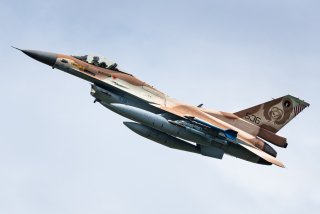America Should Follow Israel’s Lead on Iran
Israel has developed a model for directly combating Iranian aggression that America should firmly endorse.
For years, Iran’s rockets, missiles, and drones have terrorized the Middle East and, more recently, Ukraine. With its recent attacks on multiple Iranian military interests, including reportedly targeting a meeting of Iranians and Syrians to discuss drone manufacturing on February 19, Israel appears to be the only country consistently and proactively countering Tehran’s threats to regional and global security. The United States should be encouraging, supporting, and joining Israel in taking strong action to prevent Iran from carrying out terrorism and advancing its nuclear program.
Israeli drone attacks struck three Iranian targets between January 28-30: an Iranian military facility in Isfahan overnight on January 28, a convoy of six Islamic Revolutionary Guard Corps (IRGC)-linked trucks reportedly carrying Iranian weapons along the Syria-Iraq border on January 29, and Iranian-backed militia leaders in Syria on January 30.
These attacks continue Israel’s strategy to directly confront, roll back, and deter Iran’s military expansionism. Since Israel began its “campaign between the wars” in 2015, it has launched airstrikes to degrade the capabilities of Iran and its partner militias and prevent Tehran from proliferating precision weaponry. Under former Prime Minister Naftali Bennett, Israel adopted the “octopus doctrine” of imposing costs directly on the Iranian head in addition to the regime’s proxy tentacles across the Middle East.
Over the last eight years, the visible results of Israel’s approach amount to over 400 airstrikes against Iran’s regionwide military expansion, including 350 in Syria, over fifty in Lebanon, four in Iran, and one in Iraq, according to data compiled by JINSA.
The United States, in contrast, has been far more subdued in confronting Iran. In the two years since President Joe Biden took office, there have been eighty attacks on U.S. troops or contractors in Iraq and Syria, with Iranian-backed groups firing over 230 projectiles, including 170 rockets and sixty drones, according to JINSA’s Iran Projectile Tracker, which we compile. Yet, the Biden administration has launched only three rounds of airstrikes on Iranian-backed militias in Iraq and Syria.
Despite its important and consequential “maximum pressure” campaign to cripple the Islamic Republic economically, the Trump administration was not much more aggressive militarily than its successor. The exception to this is the January 2020 strike that killed IRGC Quds Force commander Qasem Soleimani and Kataib Hezbollah commander Abu Mahdi al-Muhandis, which significantly undermined Iran’s terror network. Regular U.S. strikes against those who seek to imminently harm U.S. interests, like Soleimani and Muhandis, would serve as a powerful deterrent and means of reducing Iranian capabilities.
Though both the United States and Israel have warned repeatedly over the years that Iranian weapons pose threats, only Israel regularly and preemptively damages Iran’s ability to develop, manufacture, and proliferate these weapons.
Israel’s latest reported actions are more evidence of its value as a security partner. While Washington and Kyiv have pressured Jerusalem to provide weapons to Ukraine, Israel is the only country now hindering the flow of deadly drones into Russia’s hands. Meanwhile, U.S. officials have admitted that they have not stopped the transfer of Iranian drones to Russia while European countries allow the same Iranian terror airlines that deliver drones to Russia to use European airports.
With America focused on helping Ukraine to defeat Russian forces, the Biden administration should use tools beyond sanctions and diplomacy, including military force and covert action, to disrupt Iran’s lethal support to Russia.
Working with Israel, the United States should publicly adopt a policy similar to Israel’s octopus doctrine to deter and thwart Iranian attacks and weapons proliferation by using consistent, preemptive military force. This should complement a larger shift toward a “Plan B” Iran policy—including closer coordination with Israel—in light of the clear failure of the Biden administration’s good-faith, but ultimately counterproductive, open-ended nuclear diplomacy with Iran that only further undermines U.S. deterrence in the eyes of Tehran.
Fortunately, the United States can build on recent diplomatic and military coordination with Israel, including last month’s large-scale Juniper Oak exercise, to improve and broadcast both joint readiness and Israel’s ability to operate independently. The Biden administration should expedite the delivery of KC-46A aircraft refueling tankers to Israel that would be critical should it become necessary for Israel to strike Iran’s nuclear facilities. The Pentagon should also replenish its war reserve stockpile in Israel, known as WRSA-I, which has become obsolete. However, now that the United States has transferred artillery from WRSA-I to Ukraine, there is open space to preposition the precision-guided munitions that Israel would need in a full-scale war with Iran and Hezbollah.
With Iran reportedly threatening to retaliate by targeting ships with ties to Israel, as it did in 2021 when Israel allegedly sabotaged Tehran’s attempts to smuggle oil to Syria, U.S. Naval Forces Central Command should also push for Israel to be included in the Combined Maritime Forces, which focuses on freedom of navigation, counterpiracy, counter-narcotics, and other illicit activities.
The United States should be closely partnering with Israel to degrade Iranian capabilities more broadly. Israel has developed a model for directly combating Iranian aggression that America should firmly endorse.
VADM Mark Fox, USN (ret.) is a member of the Jewish Institute for National Security of America’s (JINSA) Eastern Mediterranean and Abraham Accords policy projects. He served as Deputy Commander of U.S. Central Command and previously served as commander of U.S. Naval Central Command/U.S. 5th Fleet/Combined Maritime Forces.
Andrew Ghalili and Ari Cicurel are Senior Policy Analysts at the JINSA.
Image: BeAvPhoto / Shutterstock.com

